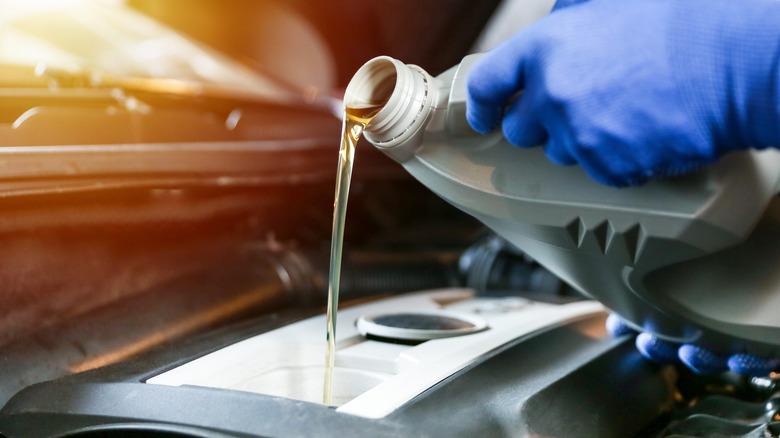Here's What Happens If You Put The Wrong Type Of Oil In Your Car
Car maintenance is an almost constant worry. The main power a vehicle needs, of course, is its fuel, whether that's gas, diesel, electricity, or some combination of those. This can be difficult to keep track of in itself at times, but our needy vehicles have more exacting requirements than that.
Another regular job, and one that some vehicle owners can (but never should) leave on the back burner, is an oil change. Almost as much as the fuel itself, this gloopy liquid is the lifeblood of a car. It's to be administered with care, though, because it's not necessarily a one-size-fits-all scenario. You might think that there's little to choose between the different types, but some oils are more suited to specific vehicles.
It won't typically be very detrimental to inadvertently use the wrong type, but drivers run the risk of potential engine damage if they do. Here's a closer look at the different types of oil and how they can affect cars they weren't meant for.
How do motor oils differ?
Essentially, motor oils can be divided into three primary types: Mineral, semi-synthetic, and synthetic. The first is developed from natural crude, while the last was created as an alternative, building on more highly-refined natural components.
Aside from these options, there are some more specialized types that are a perfect fit for specific categories of vehicles. For instance, as with almost any machine, car engines can degrade somewhat after years of use, so maintenance increasingly becomes a priority. For this reason, oils for hard-working, high-mileage vehicles are also available. Though there are no specific criteria known for the makeup of such oils, RAC notes that they are "typically thicker than conventional motor oil, and contain [...] additives that help reduce oil consumption, reduce leaks, and reduce engine deposits." They are also generally created for those who have covered 80,000 to 100,000 miles or so,
Motor oil is crucial in keeping an engine running smoothly and lubricated, and a sub-optimal choice can affect its performance. Beyond these general types, though, there are some very specific varieties of engine oil to consider: They're broken down into grades and specifications of different oils, and it's important to get a handle on how this seemingly complex system works to know what would happen if, say, such a thicker oil were to be used in a newer engine.
The specifications and grades of engine oil
When you have a specific query about your vehicle, your first port of call should generally be its handbook. That's what these often-heavy manuals are for, after all. If you're unsure about the type of oil that's best to use, you'll often find appropriate oil types listed in the format of a code of sorts. There are a wide variety of different types available.
These codes are quite simple to understand. In an oil such as a 5W-40, the first number specifies the oil's viscosity, or flow level, in winter (hence the W) or colder conditions, while the 40 provides the same information outside of such conditions. Being somewhat adaptable to the temperature, such types are known as multi-grade oils. The grade, then, determines how viscous an oil is, while the American Petroleum Institute's specifications for engine oil have changed over time (as have their code designations), beginning with SA and continuing to SP in 2020.
Drivers have a degree of flexibility, then. For example, the Ford Focus handbook notes that SAE 5W-20 oil can be used if a driver is unable to locate the specified WSS-M2C948-B but warns, "Do not use more than 0.5 L (0.11 gal) of the alternative engine oil between scheduled service intervals." Why not? The wrong type can potentially be harmful to your vehicle's engine.
Can the wrong oil damage your car?
Using this system, it's possible to determine that a given oil may be thinner or thicker than your specific vehicle requires. An oil that's less viscous than recommended can result in a lower oil pressure, which can increase pressure on your engine and contribute to wear and tear. Overheating, the bane of millions of drivers' existence, can also result.
Similarly, it follows that an oil that's too thick for a given vehicle will be unable to flow within it effectively and consistently. It's well known that friction isn't exactly metal's best friend and that lubrication can be crucial to prevent awful squeaks and creaks in the likes of hinges. An overly-viscous oil can't perform its vital job of maintaining the system and keeping it cool as effectively as it should, either, which can also cause the engine to falter, potentially overheat, and work less efficiently (and more expensively).
These harmful effects can be heightened the further a given oil's grade and specification strays from that recommended for your vehicle model. Though it can be tempting to purchase a different oil that's somewhat cheaper, there may be potentially expensive consequences.



